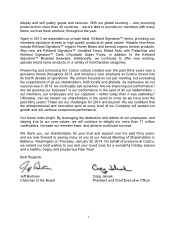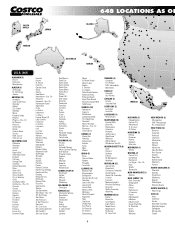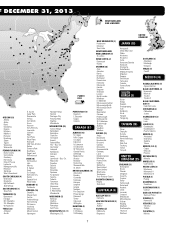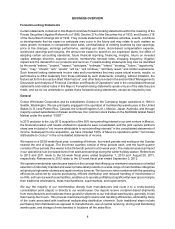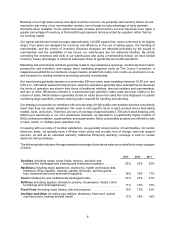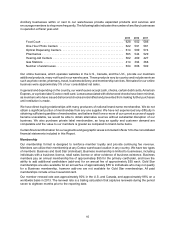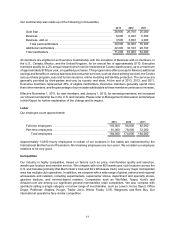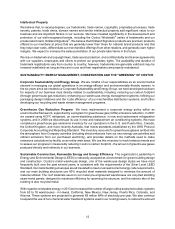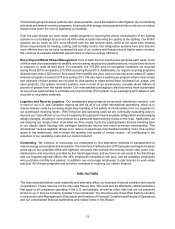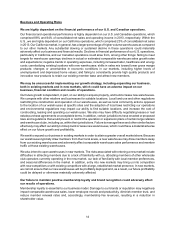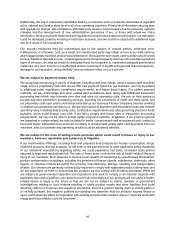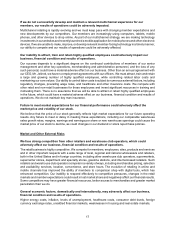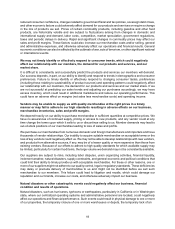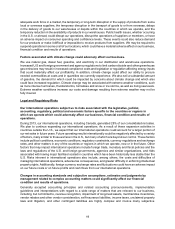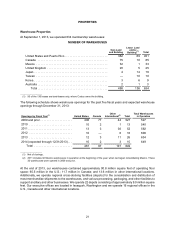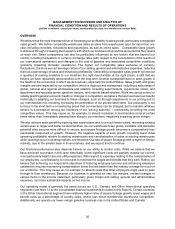Costco 2013 Annual Report Download - page 17
Download and view the complete annual report
Please find page 17 of the 2013 Costco annual report below. You can navigate through the pages in the report by either clicking on the pages listed below, or by using the keyword search tool below to find specific information within the annual report.15
In addition, we sell many products under our owned and exclusive Kirkland Signature brand. Maintaining
consistent product quality, competitive pricing, and availability of our Kirkland Signature products for our
customers is essential to developing and maintaining customer loyalty. These products also generally carry
higher margins than national brand products and represent a growing portion of our overall sales. If the
Kirkland Signature brand experiences a loss of consumer acceptance or confidence, our sales and gross
margin results could be adversely affected.
Disruptions in our depot operations could adversely affect sales and member satisfaction.
We depend on the orderly operation of the merchandise receiving and distribution process, primarily through
our depots. Although we believe that our receiving and distribution process is efficient, unforeseen disruptions
in operations due to fires, hurricanes, earthquakes or other catastrophic events, labor shortages or shipping
problems, may result in delays in the delivery of merchandise to our warehouses, which could adversely
affect sales and the satisfaction of our members.
We rely extensively on computer systems to process transactions, summarize results and
manage our business. Failure to adequately update our systems and disruptions in both our
primary and back-up systems could harm our ability to run our business and adversely affect our
results of operations.
Although we believe that we have independent, redundant primary and secondary computer systems, given
the number of individual transactions we have each year it is important that we maintain uninterrupted
operation of our business-critical computer systems. Our computer systems, including our back-up systems,
are subject to damage or interruption from power outages, computer and telecommunications failures,
computer viruses, internal or external security breaches, catastrophic events such as fires, earthquakes,
tornadoes and hurricanes, and errors by our employees. If our computer systems and our back-up systems
are damaged or cease to function properly, we may have to make significant investments to fix or replace
them, and we may suffer interruptions in our operations in the interim. Any material interruption in our computer
systems could have a material adverse effect on our business or results of operations.
We are currently making, and will continue to make, significant technology investments to transform our
information processes and systems that are key to managing our business. We must monitor and choose
the right investments and implement them at the right pace. The risk of system disruption is increased when
significant system changes are undertaken, although we believe that our change management process will
mitigate this risk. Excessive technological change could impact the effectiveness of adoption, and could
make it more difficult for us to realize benefits from the technology. Targeting the wrong opportunities, failing
to make the best investments, or making an investment commitment significantly above or below our needs
could result in the loss of our competitive position and adversely impact our financial condition or results of
operations. Additionally, the potential problems and interruptions associated with implementing technology
initiatives could disrupt or reduce the efficiency of our operations in the short term. These initiatives might
not provide the anticipated benefits or may provide them on a delayed schedule or at a higher cost.
If we do not maintain the privacy and security of member-related and business information, we
could damage our reputation with members, incur substantial additional costs and become
subject to litigation.
We receive, retain, and transmit certain personal information about our members and entrust that information
to third party business associates, including cloud service providers who perform these activities for us. Our
online business, which operates websites in the U.S., Canada, and the U.K., depends upon the secure
transmission of confidential information over public networks, including information permitting cashless
payments. A compromise of our security systems or those of our business associates that results in our
members' personal information being obtained by unauthorized persons could adversely affect our reputation
with our members and others, as well as our operations, results of operations, financial condition and liquidity,
and could result in litigation against us or the imposition of penalties. In addition, a security breach could
require that we expend significant additional resources related to the security of information systems and
could result in a disruption of our operations, particularly our online business.


